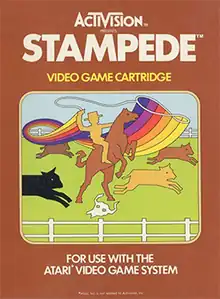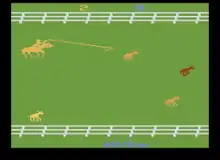| Stampede | |
|---|---|
 | |
| Developer(s) | Activision |
| Publisher(s) | Activision |
| Designer(s) | Bob Whitehead[1] |
| Platform(s) | Atari 2600, Intellivision |
| Release | 1981: 2600 1982: Intellivision |
| Genre(s) | Action |
| Mode(s) | Single-player |
Stampede is a video game written by Bob Whitehead for the Atari Video Computer System (later called the Atari 2600) and published by Activision in 1981.[1] Stampede is a left-to-right, horizontally-scrolling, action game with a cattle round-up theme. An Intellivision version was released the following year.
Gameplay

An Activision catalog from 1982 advertised Stampede in the following way:
Ready for a little round up? With Stampede by Activision, you'll have to ride fast and rope even faster. Those little dogies seem to be everywhere, and they're all worth points. But, be careful! Your ol' horse can get a little edgy, especially when you take your eyes off the trail. So, head out West for hours of fun with Stampede!" [2]
The objective of Stampede is to round up all of the cattle without letting any pass by. To do so, the player must lasso each one in order to capture it. The player is initially only allowed to let two cattle pass; if a third one slips by, the game is over. All of the cattle run in the same direction as the player, albeit slower. The one exception is the Black Angus calf, which is described by the game as "stubborn", and remains motionless, forcing the player to prioritize the calf.
An important caveat to this is that the player gets one extra free pass for every 1,000 points scored. So, if a player were at 2,000 points and had not yet let any cattle pass, the player would be allowed to let four cattle pass before the fifth one ended the game (assuming the player did not reach 3,000 points).
This makes it possible for an expert player to repeatedly beat the game, as after about 5,000 points or so the game essentially "resets," and the same pattern is repeated. According to David Yancey, there is a bug which makes it so that the game will typically only allow the player to play in a loop for eight play throughs; apparently, however, there is a version of the game with a different binary which allows one to continue to accrue points until the score 99,999 is reached.[3]
Reception
Stampede was favorably reviewed in 1982 by Video magazine where it was described as a "thrilling representation of rope ridin'" boasting "charming visuals". The reviewers noted that although the game only utilized 2k of ROM, it demonstrated Activision's success in "marketing new and unusual games" and showed that "expanding memory isn't the only way to create solid, playable games".[4]: 42
Richard A. Edwards reviewed the Atari version of Stampede in The Space Gamer No. 53.[5] Edwards commented that "This is one of the best combined strategy and action games for the Atari system. Go rope yourself a copy, pardners."[5]
In 1983, Video Games stated that the Intellivision version of Stampede was easier than the difficult Atari 2600 original with identical graphics.[6] Danny Goodman of Creative Computing Video & Arcade Games was surprised that the Intellivision version's graphics "were scarcely more detailed than their Atari ancestors".[7]
Reviews
See also
References
- 1 2 Hague, James. "The Giant List of Classic Game Programmers".
- ↑ Atari Age. "Catalog - Activision (AG-940-08)," (retrieved on March 17th, 2009)
- ↑ Archived at Ghostarchive and the Wayback Machine: Atari 2600 Stampede. YouTube.
- ↑ Kunkel, Bill; Katz, Arnie (April 1982). "Arcade Alley: Ropin', Ridin', and Skatin' with Activision". Video. Reese Communications. 6 (1): 42–43. ISSN 0147-8907.
- 1 2 Edwards, Richard A. (July 1982). "Capsule Reviews". The Space Gamer. Steve Jackson Games (53): 35.
- ↑ Wiswell, Phil (March 1983). "New Games From Well-Known Names". Video Games. p. 69. Retrieved 26 May 2014.
- ↑ Goodman, Danny (Spring 1983). "Home Video Games: Video Games Update". Creative Computing Video & Arcade Games. p. 32.
- ↑ "GAMES Magazine #28". March 1982.
- ↑ "GAMES Magazine #34". December 1982.
External links
- Stampede at AtariAge